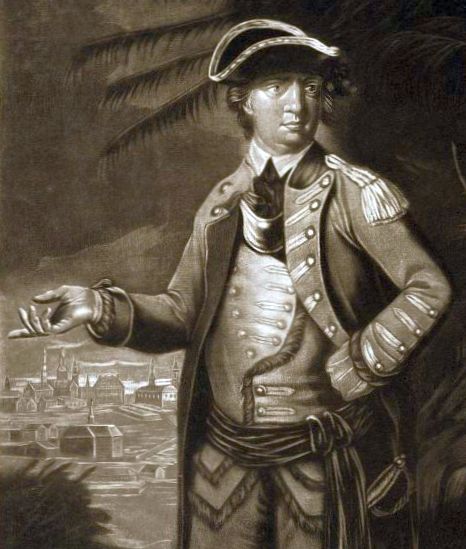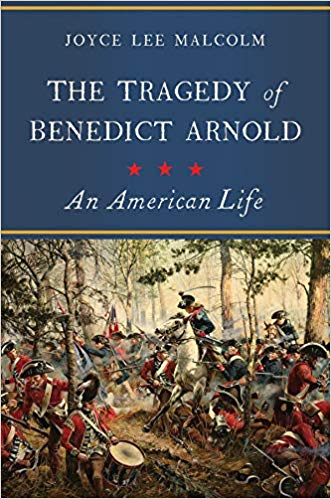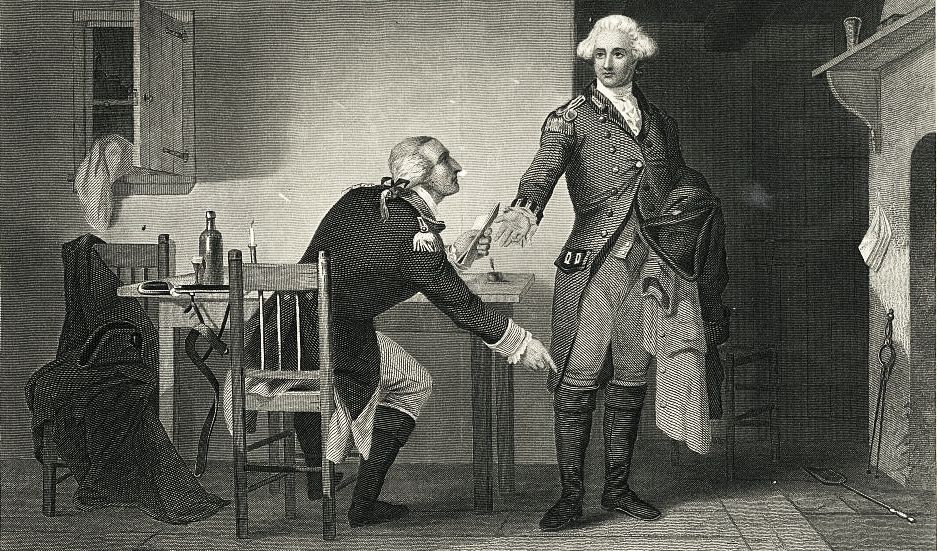While Arnold is a villain in the eyes of most Americans, he was considered the most brilliant officer on either side of the Revolutionary War. Why would he commit a crime so inexcusable?
-
Fall 2019 - George Washington Prize Books
Volume64Issue5
Excerpted from the George Washington Book Prize finalist The Tragedy of Benedict Arnold: An American Life, by Janet Lee Malcolm (Pegasus Books).

Two centuries after Benedict Arnold's death, the most infamous man in American history remains a two-dimensional caricature in the minds of most Americans: wicked, self-serving, and greedy. Numerous books have cast his young wife Peggy as equally evil, an Eve tempting her husband into treason.
Yet Arnold repeatedly risked his life and sacrificed his fortune for the patriot cause. As for Peggy, the charges against her are based on flimsy evidence contradicted by her own actions, by eyewitness accounts, and by the historical record. Replacing the cardboard cutouts that pass for historical portraits of Arnold and Peggy with a more authentic picture makes their actions, if still culpable in Arnold's case, at least more understandable; exonerates Peggy; and exposes the bitter animosities within the patriot party. It also helps us make sense of the wild fury that greeted Arnold's betrayal, bringing us closer to the people and frightfulness of that time.
See also "George Washington, Benedict Arnold, and the Fate of the American Revolution,"
by Nathaniel Philbrick, American Heritage, Oct 2017

Arnold was a national hero before he abandoned the patriot cause, and no wonder. He has been reckoned the most brilliant officer on either side of the Revolutionary War. He had that rare ability to inspire men to follow him into the face of death, even when, as at the decisive battle of Saratoga, he was stripped of military command. J. W. Fortescue, author of a classic study of the British army, described Arnold as possessing "all the gifts of a great commander. To boundless energy and enterprise he united quick insight into a situation, sound strategic instinct, audacity of movement, wealth of resource, a swift and unerring eye in action, great personal daring, and true magic of leadership."
He was courageous, resourceful, and, like most men of his time and rank, keenly jealous of his personal honor. When he joined the British side he forfeited that honor forever. Americans greeted the news of his betrayal with outrage, burning him in effigy, while the British never fully trusted him. His was a tragic fall from fame to infamy.
We are left wondering why Arnold abandoned the cause for which he sacrificed his health and wealth, and why — when so many others did the same, or prudently kept in contact with the British, or simply abandoned the patriot cause. Arnold's treason has been branded singularly egregious. Contrary to prevailing myths numerous prominent Americans remained neutral, profiteered on the war, preferred the comparative safety of politics to the battlefield, or returned to their families and businesses when their commissions in the Continental Army proved dangerous and thankless. Yet Arnold alone bears the mark of Cain.
Are these questions worth answering? Isn't it enough to know that whatever else he accomplished, the man was a traitor? In the early 19th century when Lewis Surd Walker, a descendant of Arnold's second wife, approached publishers about writing a book about Arnold, he was assured no one would want to read about the traitor. Americans enjoy reading about the patriots of the founding era, as an ever growing library of books about them attests. Despite publishers rejecting Walker's proposal, some books have also been written about "the traitor." These and other studies that do grapple with why he committed treason and why his actions were deemed so egregious have arrived at various answers.
Arnold's contemporaries and earliest biographers insisted that he was a vicious individual—period. Jared Sparks, later president of Harvard, set the tone for this wholesale blackening of Arnold's entire life. Sparks finds no tale of Arnold's sinfulness as a child too bizarre to be believed. His The Life and Treason of Benedict Arnold, published in 1835, informed readers that one of Benedict Arnold's "earliest amusements" was to snatch baby birds from their nests in order "to maim and mangle" them "in sight of the old ones, that he might be diverted by their cries." This naughty boy also enjoyed strewing broken glass in a nearby schoolyard so the children "would cut their feet in coming from the school." For Sparks, only the timely death of Arnold's devout mother relieved her "from the anguish of witnessing her son's career of ambition without virtue, of glory tarnished with crime, and of depravity ending in infamy and ruin."3 Here was a thoroughly bad child destined to mature into a very• bad man. Arnold's military achievements had already been dismissed by his personal enemies as merely self-serving, reckless bravado. Charles Royster, in A Revolutionary People at War, writes that Arnold's contemporaries "saw more than a criminal in Arnold—they saw a freak."

"They did not try hard to devise new ways to thwart potential traitors," because "there could be only one Arnold and when his country talked about him, that is what they said—over and over, in exhaustive detail and fervent imagery—there could be only one Arnold."
This indictment begs the question why Arnold had behaved so heroically and generously. Was the dishonorable treatment he received over and over again from Congress and his rivals mere slights any right-thinking man should have ignored? Or were his attackers, especially those in Congress, anxious to diminish a popular general, frightened Arnold might copy Oliver Cromwell and seize power? Why the focus on Arnold's supposed flaws anyway? Several later authors have presented a more balanced account, and I am greatly indebted to their work.
Isaac Newton Arnold—a distant relation—published The Life of Benedict Arnold; His Patriotism and His Treason in 1880. He hoped, "The time may come ... when there will mingle with his condemnation that infinite pity ... that a nature so heroic and with a record so brilliant, should have been driven, by a sense of bitter wrong and the violence of his passions, to a crime so inexcusable."
See "Why Benedict Arnold Did It," by Willard Sterne Randall,
American Heritage, Sept/Oct, 1990
More than a century later, in 1990, Willard Sterne Randall's massive biography, Benedict Arnold: Patriot and Traitor appeared. Seven years afterward James Kirby Martin produced an equally massive biography, Benedict Arnold: Revolutionary Hero: An American Warrior Reconsidered, that unfortunately ends without covering Arnold's growing defection, the influence, if any, of his young wife Margaret Shippen, his treason, and its aftermath. Dave R. Palmer pairs Arnold's life with that of Washington in George Washington and Benedict Arnold: A Tale of Two Patriots, as does Nathaniel Philbrick in Valiant Ambition: George Washington, Benedict Arnold, and the Fate of the American Revolution (excerpted in American Heritage in 2017.)
Apart from Philbrick none of these authors had the advantage of Russell M. Lea's invaluable collection of Arnold's war correspondence published in 2008, or knew of the cache of Arnold's papers recently discovered in Quebec. None has reevaluated the role of his wife in the treason.
No less than seven recent books focus on the supposed wicked machinations of his beautiful young wife, Margaret Shippen. This trend began in 1941 when Carl Van Doren, in his Secret History of the American Revolution, claimed to have found convincing evidence she was an active promoter of his defection, overturning the long-held belief in her innocence. The daughter of a distinguished, neutral Philadelphia family is now viewed as having inveigled her husband into joining the British cause. Peggy is now nearly as infamous as her husband. However, my reexamination of Van Doren's evidence, along with research into Peggy's behavior, presents a compelling case for her innocence. Good story, as these new books tell, they have damned an innocent woman. As George Washington, Alexander Hamilton, Peggy's family, those who knew her believed, she was not guilty.
A book about Arnold's life and times is well worth bringing to a wider public because the story it tells is so illuminating. It provides a keener understanding of a talented and flawed man and the meaning of loyalty in the revolutionary context, but it also exposes the bitter tensions within the revolutionary cause and the impact of what was a civil war on the lives of ordinary people. Beyond its historical value Arnold's story is a thrilling one. The Tragedy of Benedict Arnold casts a wide net, treating Arnold's personal and public life and the lively cast of characters that peopled his world. The goal is to recover, as far as possible, both the man and his time, and to improve our understanding of both. The aim is not to condone Arnold but to understand why a man who had risked everything for the patriot cause took that desperate decision to turn against it, earning not the success he hoped for, but lasting opprobrium.

